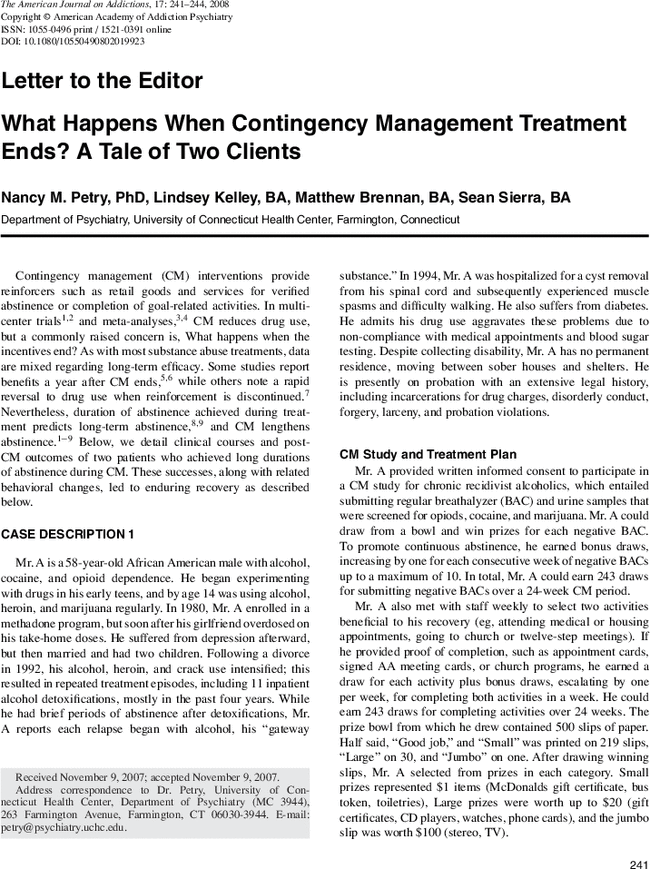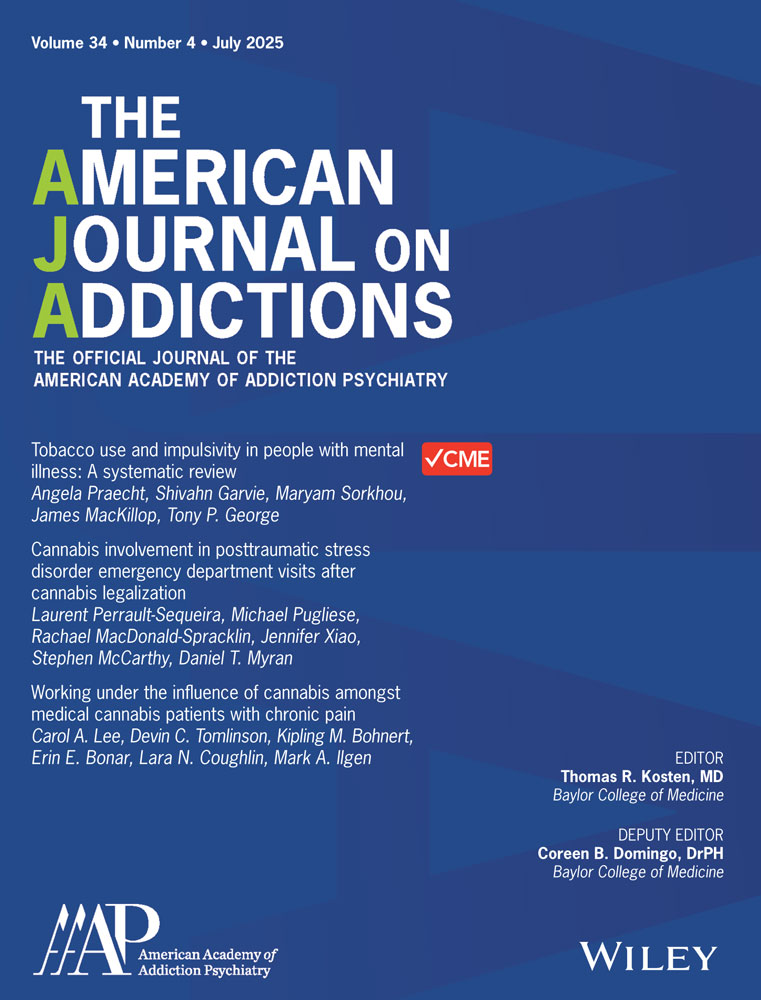What Happens When Contingency Management Treatment Ends? A Tale of Two Clients
Corresponding Author
Nancy M. Petry PhD
Department of Psychiatry, University of Connecticut Health Center, Farmington, Connecticut
University of Connecticut Health Center, Department of Psychiatry (MC 3944), 263 Farmington Avenue, Farmington, CT, 06030-3944. E-mail: [email protected]Search for more papers by this authorLindsey Kelley BA
Department of Psychiatry, University of Connecticut Health Center, Farmington, Connecticut
Search for more papers by this authorMatthew Brennan BA
Department of Psychiatry, University of Connecticut Health Center, Farmington, Connecticut
Search for more papers by this authorSean Sierra BA
Department of Psychiatry, University of Connecticut Health Center, Farmington, Connecticut
Search for more papers by this authorCorresponding Author
Nancy M. Petry PhD
Department of Psychiatry, University of Connecticut Health Center, Farmington, Connecticut
University of Connecticut Health Center, Department of Psychiatry (MC 3944), 263 Farmington Avenue, Farmington, CT, 06030-3944. E-mail: [email protected]Search for more papers by this authorLindsey Kelley BA
Department of Psychiatry, University of Connecticut Health Center, Farmington, Connecticut
Search for more papers by this authorMatthew Brennan BA
Department of Psychiatry, University of Connecticut Health Center, Farmington, Connecticut
Search for more papers by this authorSean Sierra BA
Department of Psychiatry, University of Connecticut Health Center, Farmington, Connecticut
Search for more papers by this author
REFERENCES
- 1 Peirce JM, Petry NM, Stitzer ML et al. Effects of lower-cost incentives on stimulant abstinence in methadone maintenance treatment: a National Drug Abuse Treatment Clinical Trials Network study. Arch Gen Psychiatry. 2006; 63: 201–208.
- 2 Petry NM, Peirce JM, Stitizer ML et al. Prize-based incentives increase retention in outpatient psychosocial treatment programs: results of the National Drug Abuse Treatment Clinical Trials Network Study. Arch Gen Psychiatry. 2005; 62: 1148–1156.
- 3 Lussier JP, Heil SH, Mongeon JA, Badger GJ, Higgins ST. A meta-analysis of voucher-based reinforcement therapy for substance use disorders. Addiction. 2006; 101: 192–203.
- 4 Prendergast M, Podus D, Finney J, Greenwell L, Roll J. Contingency management for treatment of substance use disorders: a meta-analysis. Addiction. 2006; 101: 1546–1560.
- 5 Higgins ST, Wong CJ, Badger GJ, Ogden DE, Dantona RL. Contingent reinforcement increases cocaine abstinence during outpatient treatment and one year of follow-up. J Consult Clin Psychol. 2000; 68: 64–72.
- 6 Petry NM, Martin B. Lower-cost contingency management for treating cocaine-abusing methadone patients. J Consult Clin Psychol. 2002; 70: 398–405.
- 7 Sigmon SC, Higgins ST. Voucher-based contingent reinforcement of marijuana abstinence among individuals with serious mental illness. J Subst Abuse Treat. 2006; 30: 291–295.
- 8 Higgins ST, Badger GJ, Budney AJ. Initial abstinence and success in achieving longer term cocaine abstinence. Exp Clin Psychopharmacol. 2000; 8: 377–386.
- 9 Petry NM, Martin B, Simcic F. Prize reinforcement contingency management for cocaine dependence: integration with group therapy in a methadone clinic. J Consult Clin Psychol. 2005; 73: 354–359.




